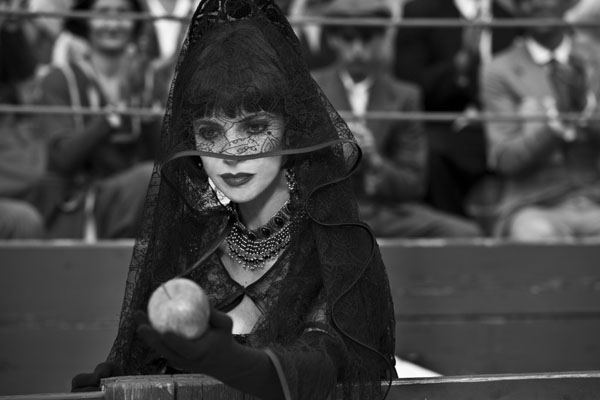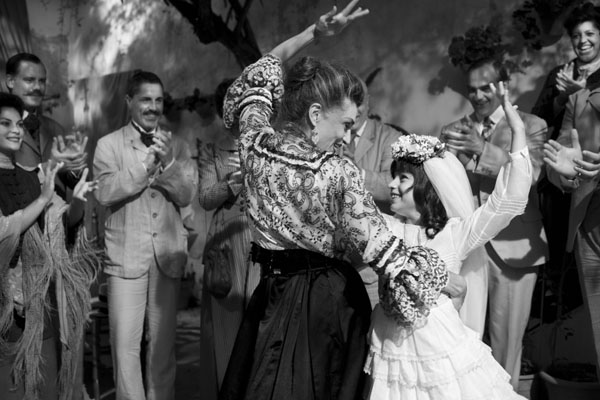“February and March have been good to silent cinema,” writes Kristin Thompson at the top of a post shot through with anticipation: The 27th edition of Il Cinema Ritrovato will open in Bologna on June 29. After introducing us to a set of new publications on the silent films of Albert Capellani and recommending Flicker Alley‘s release of a 2-disc package bundling Robert Flaherty’s Nanook of the North (1922) and Knud Rasmussen’s The Wedding of Palo (1934), she turns her attention to a new silent film, Pablo Berger’s Blancanieves, “a loose version of the Snow White story transposed to 1920s Spain,” which, as Stefan Dobroiu reports at Cineuropa, has just won the top prize at the Bucharest International Film Festival. And, as Michael Guillén notes, the film’s won “a whole slew of Goyas, including best picture, best actress (Maribel Verdú), best new actress (Macarena García), best original script (Pablo Berger) and best cinematography (Kiko de la Rica).”
Kristin Thompson: “While The Artist [2011] was a fairly good imitation of 1920s Hollywood filmmaking, Blancanieves [2012] is a pastiche of the 1928-29 era of European silent cinema. It draws on what I have termed the International Style of filmmaking, a late 1920s blend of influences from the French Impressionism, German Expressionism, and Soviet Montage movements. One could almost pass it off as a genuine film of the era.”
Macarena García stars as Carmen, “the daughter of famous bullfighter Daniel Giménez Cacho.” Noel Murray at the AV Club, where he gives Blancanieves a B+: “After Cacho is rendered paraplegic in the ring, García joins a band of dwarf bullfighters, escaping the clutches of her vain, taskmaster stepmother Maribel Verdú, in a knowing riff on the Brothers Grimm’s ‘Snow White.’ Blancanieves‘ plot is gimmicky, but Berger mainly uses it as a line on which to hang one craftily shot and cut setpiece after another, starting with a thrilling opening sequence that begins with Cacho getting dressed for a fight, continues with him strutting around the ring with raw confidence and sexuality, and ends in the chaos of a goring and a bloody surgery, intercut with García’s birth…. Yet what makes Blancanieves such a wonder is how well Berger handles the smaller, more grounded scenes.”
Noting that Berger, 50, is “Spanish born and NYU educated,” J. Hoberman, writing for Artinfo, also points out that “the Seven Dwarfs are los enanitos toreros, appearing late in the movie as an itinerant troupe of six short-statured bullfighters who might have stepped from a Velazquez painting or a Buñuel film. (Angela Molina, the title character in Buñuel‘s That Obscure Object of Desire, appears as Carmen’s benign grandmother.)… Berger’s production design is detailed and impeccable—as is his mise-en-scène…. The expressionist lighting, gothic architecture, and textured look are self-consciously European although it’s striking that Maribel Verdú (best known here for her role in Y tu mama también), slinking and vamping through the role of the Stepmother like Gloria Swanson in Sunset Boulevard, and Antonio Villalta, in the role of Carmen’s beloved wheelchair-bound Father, strongly resemble the two ersatz Hollywood stars of The Artist, Bérénice Bejo and Jean Dujardin.”
For the New York Times‘ A.O. Scott, “Blancanieves never quite achieves the uncanny, haunting intensity of the silent films it so studiously and lovingly mimics,” and Nick McCarthy, writing in Slant, finds the film to be “a feat of visual storyboarding rather than storytelling.”
But Time Out New York‘s Joshua Rothkopf recommends catching it if you can (four out of five stars): “Guy Maddin pulled off a similar feat with his exquisite retrosilent, Dracula: Pages from a Virgin’s Diary (2002); maybe our bedtime stories are best seen and not heard.”
More from Sean Axmaker (Seattle Weekly), Jordan Hoffman (Film.com), Jen Kagan (Stranger), Eric Kohn (Indiewire), Kenneth Turan (Los Angeles Times), and Chuck Wilson (Voice). Esther Yi interviews Berger for Filmmaker.
For news and tips throughout the day every day, follow @KeyframeDaily on Twitter and/or the RSS feed. Get Keyframe Daily in your inbox by signing in at fandor.com/daily.





